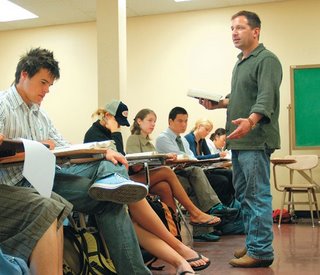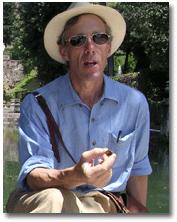Poetry Northwest: Diving Back in with David Biespiel

David Biespiel is the new editor of Poetry Northwest. Here are some links that profile him:
Oregon State Barometer: Living the life of a poet
About Poetry: David Biespiel
The IBPC Judge (He is the current judge, now reading June's poems)
Department of English at Oregon State University: Faculty: David Biespiel
Here is his current monthly article in The Oregonian: Emotion can move with authority or ambiguity
~~~~
The first words at Poetry Northwest's new web site are:
Poetry Northwest is back!
With a radical new format, a new design, & new offices at The Attic in Portland, Oregon, we're delighted to resume publication after a four-year hiatus.
From that same web page, you can click to nine articles and reviews on the relaunching of Poetry Northwest. Here is an excerpt from one, a quote from David Biespiel in The Portland Tribune's Portlander resurrects Poetry Northwest:

"I wanted it to feel like any other magazine you hold in your hand, rather than this fetishizable thing," he says. He’s referring to Poetry Northwest’s old 8 1/2-by-11-inch folded format. Poetry Northwest (1959-2002) was the longest-running poetry-only journal in the country, with a circulation of 1,000.
The new format balances poetry in the front half of the magazine with prose of interest to the general reader--or at least the non-poetry reading reader.
The first part is true, this magazines feels accessible just in the picking up of it, and the look of it. The balance, however, is heavy onto the poetry side, and the articles are not necessarily of interest to the general reader. The photos are fabulous on the cover and alongside the fine interview with Jock Sturges. The interview is interesting to me. But the parallel of poetry and photography within the interview is more for the photographer, or photographer/poet. Drawing the parallel helps Sturges bring poetry to photography, or helps him explicate it for us. But the focus on imagery narrows a poetry discussion, as here:

Jock Sturges:The word "poetry" is, for me, synonymous with the phrase, "visual grace"--whose lucid apprehension is one of my chief ambitions when making photographs. Poetry creates cues for the mind to conjure images. . . .
He is right, and this master continues with a fine discussion. If I had a wish for this article, it is that the interview did not touch so late on the pornographic charge, such that it takes reflection to find him not guilty. Instead, a little earlier, such that the work would make its own federal case. But, photographers and photographer/poets, this is for you, probably a must-read.

On the Peter Campion article Against Principles: On the Practice of Criticism, he looks at Dana Gioia's and then Ann Lauterbach's work, slamming Gioia and getting into an edgy critique of Lauterbach's. Gioia is a champion for arts and poetry. Leave the guy alone. Unless this is one out of ten criticism articles in an issue, which would call for a comprehensive look at current poetry discussions--my critique is to find what is pro-poetry, not be so anti-poetry-champion. So maybe I won't buy Disappering Ink by Gioia, and after this article, probably not Writings on the Poetics of Experience by Lauterbach either. Is there nothing out there to get behind?
In the back of the issue, in the "Some Books" section, where the reviews are two or three paragraphs, a hard little reading of Billy Collins work, The Trouble with Poetry: & Other Poems, among the eleven others briefs on books, puts this new work in a certain perpective:
The trouble with Collins's book of poetry (who can resist?) is that it's a collection, at best, of occasionally crafted "occasions," thin metaphors, sentimentality, and self-affirmation.
So maybe Collins slipped. If so, that's how he'd fall. Before I would buy it, I would leaf through it discerningly now.
Let me say, though, that I concur with Robert Pinsky, who said in Book World, "The first issue of the newly revived Poetry Northwest is very impressive." The poetry is very impressive.

Also on that list of links on the Poetry Northwest site, is Christian Wiman, 'The Secret' and 'A Poem Is Not a Prayer' at Poetry Daily. 'The Secret' is one of the two poems I will get into further down as being not ready for prime time, along with one by Robert Bly. 'A Poem Is Not a Prayer' is a good one, as you can read. This makes me wish there were more of the other poems online, so that internet readers could make a better assessment, from within these enormous resources provided by the web.

Closer to what we find in the issue, par for the new Northwest course at The Attic, is C. K. William's Thighs, in which we have a very well done war poem, worthy for the best of poetry publications, one that should be published, a definite yes, but still not as remarkable as some in this issue--yet somewhat representative of the shifts, which give depth to the reading, and surprises of the poetry published within.
Some of the poems make this issue remarkable. Among them, I will get into one by Richard Kenney that dropped my jaw for its apparent intent, and another by Albert Goldbarth that will take your head off I promise. Other poems call poetry form to mind, where much of the poem is in how it was written, or even that it would become a poem. In this sense, Biespiel not only found poems, he found poets. By issue's end, we have been given a thorough Division I work out poetically. Let's dive in.
 The first poem in this issue. What should it be? What could it be? I highly doubt Biespiel was unconscious when he chose "Rear View" by Richard Kenney. Wouldn't we all wonder, how to begin a new issue with a new format of a classic poetry magazine after a four-year hiatus, after that classic went down slowly, as unsupportable as a herd of dinosaurs in the current economy. Here's the first stanza:
The first poem in this issue. What should it be? What could it be? I highly doubt Biespiel was unconscious when he chose "Rear View" by Richard Kenney. Wouldn't we all wonder, how to begin a new issue with a new format of a classic poetry magazine after a four-year hiatus, after that classic went down slowly, as unsupportable as a herd of dinosaurs in the current economy. Here's the first stanza:At 90 on I-90 out of Anaconda,
Montana, a lone Deinonychid biker--look,
He's passing: he's taking the road like a dog on a leg,
Or the flatulent jump of a Thompson gun.
 A hip neo-dinosaur, letting us know all of where we come from. That's what we'll have in Poetry Northwest's new era. Just to whet the whistle for this cool poem, here are two lines from the fourth stanza:
A hip neo-dinosaur, letting us know all of where we come from. That's what we'll have in Poetry Northwest's new era. Just to whet the whistle for this cool poem, here are two lines from the fourth stanza:I watch his flogging shadow, thrown noon-low
Below the chassis. It writhes like a count's cape
I did not notice it as much in this fine poem by Kenney, because the writing is superior and takes me off the page from first to last, and the last is nicely done. But my criticism to him, which may seem trivial, has to do with those distracting capital letters beginning each line. In a poem that is not quite working as well, the upper cases take over as if it is some neo-(E.E. Cummi)ngs piece. Watch this in "Shall I Compare Thee to Appearances" as it shifts from stanza one to stanza two:
But also beautiful; but what I'm thinking
Is: Rainier. Invisible all month behind a veiling
Weather one wouldn't have thought could cloak a moth-
Wing, well, tonight . . .
What was that? Let me read that again? To me, the first meaning behind this poem is that Kenney could not lower the upper cases his word processor automatically puts in, before he sent it off for publication.
One of the beefs from online poets, has to do with the assertion that much of what is published online, is as good as what is in print--so how about due credit. But also, that the writing can be superior in the web publications. Many poems published online come first out of online workshops.
 Two poets show up in Poetry Northwest with poems that would have benefited from such online workshopping, at, say, Poets.org and Desert Moon Review, which together produced this past year's top three IBPC poems of the year 2005. I will give partial online poetry workshop crits, first to Robert Bly's poem, and then to one of Chris Wiman's.
Two poets show up in Poetry Northwest with poems that would have benefited from such online workshopping, at, say, Poets.org and Desert Moon Review, which together produced this past year's top three IBPC poems of the year 2005. I will give partial online poetry workshop crits, first to Robert Bly's poem, and then to one of Chris Wiman's.Bly's poem "Visiting the Ruins at Chaco Canyon", of all 28 poems in the issue, is one of the strongest in memorable imagery. No matter what he said, or how he said it, the end of the first stanza burns in nicely:
. . . . After hours like that
In the kiva, when I came up the ladder,
I would have turned to my mother, maybe bowed,
Brought her a basket and some gifts from the hills.
You may spot some excess verbage in that passage. But I am going to work with all that preceded, starting with the first three lines:
We saw the place where the Amazi lived. They weren't
There any longer. But the fitted stone walls were,
And the wind, and those kivas sunk in the ground
The first sentence is almost completely unnecessary, and the tense is funky for the telling. How about something like:
The Amazi aren't there any longer. Fitted stones are,
the wind, and those kivas sunk in the ground
Next:
Where the men sang to the belly of the earth.
To sing like that must have quieted them.
It would have quieted me. After hours like that . . . .
The "Where the men . . ." line is fine, minus maybe one "the". The next two lines can be replaced with a comma after "earth" and then:
quieting them. After hours like that
Yielding:
The Amazi aren't there any longer. Fitted stones are,
the wind, and those kivas sunk in the ground
where men sang to the belly of the earth,
quieting them. After hours like that . . . .
As to Wiman's poem The Secret, it has an entrance issue:
Daily higher the ivy dies,
Leaf by leaf subsiding white
Like a secret that seems to rise
It's going to kill Wiman to reverse "white" with "subsiding" but this is why I say that Bly's and his are not ready for prime time. In fact there is enough end rhyme and near rhyme in this poem, to tolerate another internal rhyming. It's okay. The cadence especially at line's end will be fine, to break meter here as elsewhere, and to have:
Daily higher the ivy dies,
Leaf by leaf white subsiding
Like a secret that seems to rise
Nice image, and a forgivable inversion, except that the unforgivable is yet to come, albeit a great try:
In spite of books and better light,
In spite of air and what friends say,
A rare arrested day, brief shoots,
In spite of all he cuts away:
Look at "brief shoots" the intentional stopper, almost an interruption to the poem, and what does that mean? It sounds like something that did not work in another century's poem. The device does not work now. Possible enjambment to the missing word, "sprout" "grow" or "appear" on the next line, or something. But better, something like "shoots sprout." The musing of this poem is exceptional, however.
This brings something to mind, something I cannot find fault with, but calls out to be looked at. It happens in one of Jehanne Dubrow's poems. In "Cursed" each of the 28 lines except for two has eight syllables. The two that do not, have ten. The second occurrence is in her third stanza:
the line of where a woman died
clutching a newborn to her chest.
"A miracle," they say and kneel to pray
away the past besides the weeds.
Why not delete "kneel to" from that third line? To me, it even sounds better moving into that next line.
Dubrow's other poem, "'As Roots of a Tree'" in its perfect or complete hexasyllabic form, is in a similar theme category as C.K. William's poem, and I favor Dubrow's. Not that there's a contest on, but I want to mention how good some of the poetry in this issue is.
Here are the first two stanzas to "'As Roots of a Tree'" (and the poem does not relent, the final image [not quoted] effectively searing the reader):
Charred forms lay near a stump
of cleaner shapes, corpses
whose clothes were still intact.
The flames had gasped from east
to west, chasing a few
last breaths of fuel. Stray dogs
The language tries to run free, tries to be prose libre, but it cannot quite escape the fire, the confines. There is not a hitch in this poem. It flows down the page, running like fire chases. The syllabic of it is also out of respect for, and a tribute to, the dead, as if painstakingly chiseled to be easily read, which it must have been.
 We encounter the ghazal form in two poems by Marilyn Hacker. The first is called by its radif, its repetend, "Myself." The die is cast with the title. This is true clever troubador territory here. Is she that good? Are you, am I, that good? Can a viable poem be written with "myself" being repeated at the end of each couplet and twice in the first, for these nine couplets on the page?
We encounter the ghazal form in two poems by Marilyn Hacker. The first is called by its radif, its repetend, "Myself." The die is cast with the title. This is true clever troubador territory here. Is she that good? Are you, am I, that good? Can a viable poem be written with "myself" being repeated at the end of each couplet and twice in the first, for these nine couplets on the page? The answer is yes. Marilyn Hacker can. Bravo! The last sher, or couplet, is the best, but I cannot with any good conscience give that event in poetry away. Here is the sixth instead:
Although I'm manifestly "not my type"
the one in my bed this morning was, all the same, myself.
 "'Places to Swim'" by Talvikki Ansel, very well done, fulfilling the title marvelously with compelling poetics, and formatting, and a 10-point dismount, will leave you thinking out and off the poem. This is much like what the first poem, "Rear View" does with its ending also. Ansel's, in this sense, is a sort of poetry event almost mandating publication, in that it is mused marvelously, taken on, realized, and fulfilled to a very nice read. Another poem in this sort of "compelled to publication" category, is Kevin Miller's "You See Yourself as You Might Be."
"'Places to Swim'" by Talvikki Ansel, very well done, fulfilling the title marvelously with compelling poetics, and formatting, and a 10-point dismount, will leave you thinking out and off the poem. This is much like what the first poem, "Rear View" does with its ending also. Ansel's, in this sense, is a sort of poetry event almost mandating publication, in that it is mused marvelously, taken on, realized, and fulfilled to a very nice read. Another poem in this sort of "compelled to publication" category, is Kevin Miller's "You See Yourself as You Might Be." 
Two poems present themselves to me in such a way that I wonder, only at first, whether they ought to be categorized as poems. Here's how Michael Blumenthal's poem "And How Shall the Angels Dissolve? How Shall the Night Prevail?" begins:
It may be there is nothing more monumental
than this mere shadow on the wall, dancing
as fast as it can, or that young boy, ecstatic
with how tall he has grown, though it is mere physics
and the reflection of light that have made him so,
examining his reflection as he moves, shaking his head// . . .
The poem, however, stirs up thematically higher and higher in a long sentence to a great crescendo. The poet is correct to cast this prose into tercets, and be sure the reader knows from the get-go, that a poem is being read. A case of a poem being what the poet wrote.
 The second poem that brings with it a question of poetry versus something else, maybe short fiction, is Campbell McGrath's "Order and Disorder." The third paragraph, or stanza, as it were, is well over a hundred words long. Here are the first two-plus stanzas, leading into that prose-poetry-like paragraph:
The second poem that brings with it a question of poetry versus something else, maybe short fiction, is Campbell McGrath's "Order and Disorder." The third paragraph, or stanza, as it were, is well over a hundred words long. Here are the first two-plus stanzas, leading into that prose-poetry-like paragraph:Long swim today: patterns of the sand on the ocean floor, barely a wave, just the calm parallel sand ripples endlessly repeated.
And the places where
the pattern shifts, the sequence breaks
and then resumes on a different tangent or defile. . . .
What is happening, is a fulfillment of the title into form. Some wonderful cosmic thoughts occur, and some extraordinary language, such as here:
The hurricane, too, is beautiful, graven vortex swirled like the hair on an infant's skull,
blank eyes of sharks and serial killers.
 Great stuff, poetry fans. Speaking of which, I want to get to what I consider the best poem in the issue, "The Way That Images Work" by Albert Goldbarth. This poem, is in the category of Ansel's "'Places to Swim'" and Miller's "You See Yourself as You Might Be" in that, if the poet can pull off a poem with such a title, truly pull it off, the poem becomes a must-read, and therefore a must-publish.
Great stuff, poetry fans. Speaking of which, I want to get to what I consider the best poem in the issue, "The Way That Images Work" by Albert Goldbarth. This poem, is in the category of Ansel's "'Places to Swim'" and Miller's "You See Yourself as You Might Be" in that, if the poet can pull off a poem with such a title, truly pull it off, the poem becomes a must-read, and therefore a must-publish. Goldbarth does far more than that. The poem is difficult to excerpt for all its worth. I will begin where the poem does, and then just speak about it afterward:
The circus: 1955: a row of elephants posing
with the bulk and grandeur of Babylonian gods:
some monkeys riding poodles: a midget car
In one sense, he has us wondering if or how he will fulfill the title. I am wondering what imagery devices he will institute into the poem. This might be cool, I'm thinking. But then, a pivotal event takes place that draws me into the drama of the poem. The poem then ends by turning the images around in spectacular fashion. But, this is not enough for Goldbarth. Upon afterthought, the poem takes on a displacement. This poem does not have a perfect 10 for a landing. It contains a Division I triple reverse Olympic trope with a perfect entry into poetic water at the end. Three 10s.
Here is where you may subscribe:
Poetry Northwest Subscriptions, where it says:
Necessary Reading... Don't Miss a Single Issue.
.
1 Comments:
You sold me--I subscribed to Poetry Northwest.
Great review, very opinionated, but with plenty of compliments, makes for interesting reading.
Carol
Post a Comment
<< Home